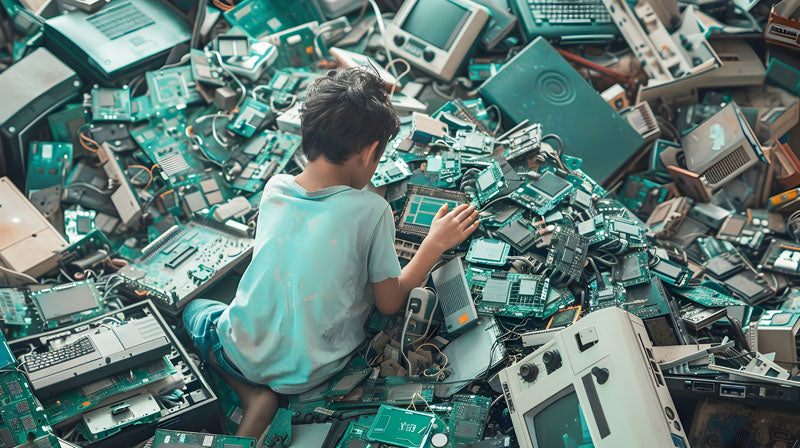The extent of the e-waste issue = the equivalent of 1.55 million trucks lined up on the Equator! International E-waste Day’s aim is to highlight the growing issue of electronic waste and promote responsible e-waste management.
According to the UN, 8 kg of e-waste per person was produced worldwide in 2023. This means 61.3 million tonnes of electronic waste discarded within a year – more than the weight of the Great Wall of China. Only 17.4 per cent of this waste, containing a mixture of harmful substances and precious materials, will be recorded as being properly collected, treated, and recycled globally. The remaining 50.6 million tonnes will be either placed in landfill, burned, or illegally traded and treated in a sub-standard way or simply hoarded in households. Even in Europe, which leads the world in e-waste recycling, only 54 per cent of e-waste is officially reported as collected and recycled and the lack of public awareness is preventing countries from developing circular economies for electronic equipment.
According to the latest UN’s General E-Waste Monitor, in 2022, 62 billion kg of e-waste were generated globally. This means 1.55 million trucks filled with e-waste lined up along the Earth's equator. The quantity of e-waste is expected to rise to 82 billion kg by 2030. Currently, the amount of e-waste is growing five times faster than formal recycling collection rates since 2010.
Initiated by the WEEE Forum and its members, International E-Waste Day aims to highlight the importance of the formal and responsible management of e-waste and the solutions available to each citizen within their community.
The 2024 campaign is themed Join the E-Waste Hunt - Retrieve, Recycle, and Revive!, which is focusing on the unused electronics that people store in their homes without realising these items contain valuable materials that could gain a new life. E-waste includes anything with a plug, cable, or battery, but the most often ‘forgotten’ items are small electronics: old mobile phones, cables, USB keys, card readers, game consoles, and other devices that are often kept out of sight in drawers. By inspiring people to declutter their homes of unused devices, everyone can contribute to pollution reduction, resource conservation, and energy and CO2 savings. Repurpose your tech with Sustainable Tech 4 Good’s circular economy and help bring the e-waste mountain down whilst also supporting digital inclusion.
Statistics sourced from weee-forum.org

